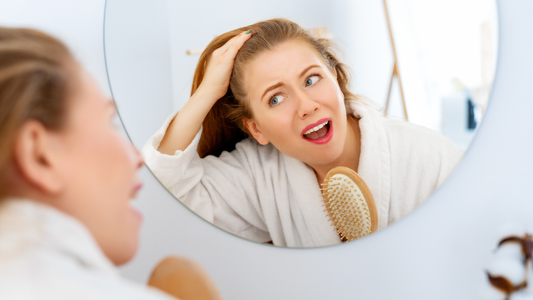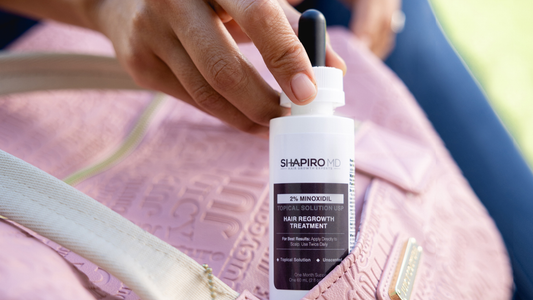Hair loss is now one of the most common problems facing both men and women these days. While dermatologists believe that hair loss is mostly determined by genetic or hereditary conditions, they now recognize that a variety of factors can play a role, including medications, medical complications, and hormonal changes.
That’s why when it comes to addressing hair loss, it’s essential to understand the root cause for each individual.
DHT levels: Hormonal Hair Loss
Hair thinning in men and women is typically caused by a combination of two factors: varied dihydrotestosterone (DHT) production and sensitivity to androgenic hormones.
DHT, which is a byproduct of testosterone, plays a critical role in promoting hair loss. It binds to the hair follicle, shriveling and weakening the growth process over time. As a result, increased DHT at the scalp contributes to slow hair growth, and patients may eventually notice no hair production whatsoever.
Genetics Contribute to Hair Thinning
Genetics can determine just how susceptible you are to pattern baldness or alopecia. The largest genetic study of hair loss conducted to date revealed that there may be over 250 individual genetic ‘loci’ that can contribute to pattern baldness in men. In other words, genetic traits play a key – though poorly understood – role in hair loss.
A quick scan of your own family tree, looking for thinning or balding hair, may determine whether or not your hair loss is hereditary.
Medical Conditions Can Contribute To Hair Loss Problems
Some health conditions are known to contribute to hair loss and hair thinning. Iron deficiency, eating disorders, thyroid issues, lupus, diabetes, and anemia can all cause or contribute to hair loss. The good news, however, is that receiving treatment for these underlying problems may help stop, slow, or even reverse hair loss. If you suspect untreated health problems are contributing to your hair loss, see a doctor.
Poor Diet May Even Lead To Hair Loss
We know your diet affects your health, and there’s increasing evidence that a poor diet can impact the health of your hair as well.
One of the most common diet-related hair problems stems from a lack of protein-rich and iron-rich foods, leading to iron deficiency. When this happens, the body starts seeking key proteins elsewhere, and it can even begin to steal proteins from your hair follicles. Ferritin, for example, is an important protein related to hair growth. But in anemic or iron-deficient people, the body can steal ferritin from the root of the hair, slowing hair growth and contributing to hair loss.
Likewise, excessive or rapid weight gain and even weight loss may also contribute to hair loss.
Medications Can Result in Hair Thinning and Loss
Some medical treatments and medications come with side effects that can eventually disrupt your hair production and cause thinning.
Medications that can cause or contribute to hair loss and thinning include birth control pills, blood thinners, certain drugs that are used to control blood pressure, and of course many treatments for cancer. Talk to your doctor about whether your medications could be contributing to hair loss, and whether there are alternatives on the market that might not carry this same side effect.
Stress May Contribute To Hair Loss
Stress can lead to hair loss, and in today’s hectic world, it’s become more of a problem than ever.
If you're undergoing physical or emotional distress, you may experience hair loss for several weeks or months. The good news is this can be treated, and often these hair loss issues are temporary, eliminated by improving your stress and mental well-being. Once you have addressed the cause, there's a good chance you'll notice no more hair loss.
Common Myths Regarding Hair Loss
There are a host of myths surrounding hair loss that have led people to many practices that have no effect on hair health whatsoever. In fact, many myths and treatments are likely to limit the effectiveness of your hair treatment, and understanding some of these myths can help you identify and combat the true cause.
Myth #1: You’re experiencing hair thinning because of your increased stress levels
It’s absolutely true that emotional strain, anxiety, and traumatic events can lead to temporary hair loss. However, these typically do not contribute to permanent hair loss, or pattern baldness in men and women.
If your hair loss has only worsened with time or age, or persisted beyond a few stressful months, it’s time to consider that this thinning is related to genetics or otherwise.
Myth #2: Wearing hats causes baldness
Many people believe that putting on hats lead to hair loss. But dermatologists agree that the hat you've been sporting is unlikely to be wreaking havoc on your underlying hair health.
Myth #3: Direct sunshine can make you go bald
Staying under the sun for an hour or two may make you feel like your head's on fire if you’re getting burned; however, sustained exposure to the sun does not directly cause hair loss. According to hair experts Drs. Steven Shapiro and Michael Borenstein, if you notice your hair becoming lighter due to sun exposure, it’s likely related to a lack of moisture, not sun damage directly. Proper hair care and treatment can help avoid this issue altogether.
Myth #4: Using shampoo makes you lose your hair
It's one of the most common myths for hair loss, but the act of shampooing does not contribute to baldness. In fact, it can actually help to clean your scalp by removing accumulated debris and pollution from hair products and the environment. But it’s important to mention here that using chemical-heavy shampoos daily, that are not intended for thinning hair, can affect its health.
Myth #5: Increased levels of testosterone are causing hair loss
This one is kinda-sorta right. It’s not testosterone, but a specific downstream product called Dihydrotestosterone (DHT), which can contribute to hair thinning. DHT is a powerful male sex hormone that’s actually responsible for forming the genitalia in utero. But DHT can also negatively influence hair follicles’ growth cycle over time, and as we age it can essentially weaken/shrink the follicles. DHT-blocking shampoos may be a good option.
Myth #6: You only go bald after crossing 50
A large number of medical studies have revealed that your age has nothing to do with baldness. The American Hair Loss Association indicates that 66% of Americans tend to experience pattern baldness by the age of 35. While it can be more pronounced as we age, this often has to do with how our hair follicles interact with hormones.
What Are My Treatment Options for Hair Loss?
Now that you know the major causes and common myths regarding hair loss, you should know that there are a variety of treatment options: both over the counter and prescription.
The earlier you treat your hair loss, the easier it will be to prevent further damage. Today, medications such as minoxidil and finasteride are the most effective treatments to help reverse hair loss and promote hair growth. Finasteride is an oral medication that stops/slows DHT production, which is one of the major causes of hair loss. Minoxidil, meanwhile, is a topical medication that helps strengthen your hair follicles and stimulate hair production and growth from the outside in. Minoxidil does not interrupt DHT production.
Natural Supplements and Products For Hair Loss
There’s a vast array of over-the-counter and natural hair products out there that can help combat hair loss. The benefit, of course, is simplicity, and that these can be accessed more easily and sometimes cheaper. Because they're often naturally sourced, you can have faith that the ingredients are generally safe.
Solutions like Shapiro MD’s Natural Kit can provide thicker, fuller looking hair with a simple shampoo and conditioner, and they’re made with naturally-occurring ingredients that have been shown repeatedly to act on some of the underlying hair loss pathways (the potential for DHT-fighting, for example).
Shapiro MD’s Complete Kit was designed to provide the benefits of their Natural Kit, with prescription-grade minoxidil as well. As part of this one-two punch, minoxidil has been clinically proven to help regrow hair.
The Takeaway
No doubt, excessive hair loss that contributes to baldness is a problem for both men and women. Fortunately, Shapiro MD’s hair solutions can help in rejuvenating hair health. Whether you want the power of prescription-grade minoxidil or want the simple all-natural potential of DHT-blocking shampoos and conditioners, these haircare solutions are tailored to provide the help you’re looking for.





5 comments
I have been using your shampoo for quiet a few months now, it’s a good shampoo but it will not help grow hair or stop what you have from falling out.
Oops if I learned to read a little more then I’d realize what you have I do a collagen liquid collagen and I put that in my my water. I just guess I have to read up more on Shapiro MD find out what I’m missing thank you for letting me ramble on about many things that I didn’t know about
Oops if I learned to read a little more then I’d realize what you have I do a collagen liquid collagen and I put that in my my water. I just guess I have to read up more on Shapiro MD find out what I’m missing thank you for letting me ramble on about many things that I didn’t know about
Well I don’t know if it’s a comment but it’s more of a question there’s a lot of places that make pill form for hair loss like that new nutrient neutral hair or whatever it’s called. I was wondering if you guys were going to come out with something that was specifically of hair loss I know that these or and The Matvlix is for other things in the inside of the body but I was wondering if you were going to come out with a capsule that’s for the hair that’s made with the Ezorb
I am taking Finestride and applying Minoxidil daily. I also use Shapiro hair products and so far, I have seen great results on the back of my head. I have now been using these in combination for over a year. I love it and will never stray from my daily routines—it is worth it. My question is this, have I topped out? Are there non-surgical ways to encourage regrowth in the front? If so, what are people doing? Have these approaches produced measurable results? How expensive? What are your thoughts on stem cell? Is this a hoax?
Thank you.